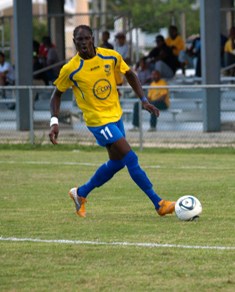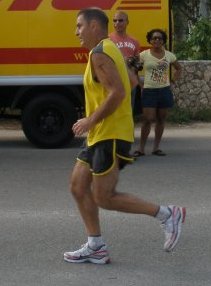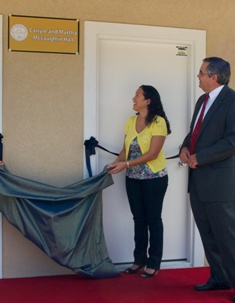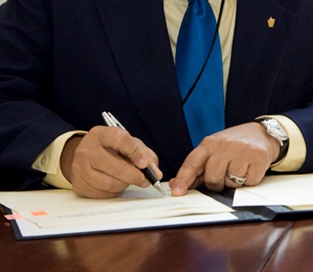Archive for September 26th, 2011
Locals to get reserve jobs
(CNS): As part of the forthcoming rollover suspension, the labour minister has announced that a range of jobs will be set aside as the reserve of Caymanians only or a limit imposed on the number of work permits that can be issued in the country in a given year. The labour minister revealed that a draft bill will come before the Legislative Assembly in November designating certain positions as exclusively reserved for Caymanians or in some case a quota system will control the number of permits for a specific type of job. The bill has come out of a private member’s motion by UDP backbenchers and debated in the Legislative Assembly last September, where it was proposed that a committee would be established to examine the concept.
Although government has not yet indicated which positions will be carved out as the preserve of local workers only, speaking in West Bay at a public meeting last week, Rolston Anglin said that a draft bill had been drawn up to give effect to that motion and it was ready to come to the Legislative Assembly. The bill, which will form part of numerous amendments that are expected to the immigration law, will designate specific jobs and professions for Caymanians that will be implemented alongside the rollover suspension to protect and create job for locals.
He said the rollover was never about protecting Caymanian jobs and was always about population control. Anglin said that it was economic growth that would generate new jobs and career opportunities for Caymanians, not keeping rollover, as fears about what would happen had been raised at the meeting.
The minister said that government had now taken the view that there ought to be certain professions or certain careers that will be designated “either fully or partially” as belonging to Caymanians only and not work permit holders.
He said that it was clear when business owners are giving the opportunity of hiring a young Caymanain with no experience versus a cheaper alternative from elsewhere with experience, they always hire the cheaper alternative, despite the permit fees. The minister said the new law would go some way to address that issue and would be implemented alongside the rollover suspension.
“Government is moving forward with this very important piece of legislation,” he said. “And that needs to be considered in conjunction with the decision to review the social and economic impacts of the rollover policy.”
Anglin did not give any indication of which jobs were likely to be carved out for locals or what research the committee that had reviewed the proposal had conducted. During the debate about the proposal in the Legislative Assembly last year, he had pointed to heavy equipment operators as one of the jobs that might be a reserved occupation.
According to the Hansard record, Anglin had said, “A few decades ago all of us in this House knew who the heavy equipment operators were in this country,” but added, “It grieves me every time I see a non-Caymanian on a backhoe.”
He said there were many skilled and semi-skilled positions for which businesses had been making excuses, saying that they could not find a Caymanian.
“As there is that option of a work permit available in certain professions, the natural gravitation for a business owner — and I’m not talking about a business owner doing anything wrong, I’m talking about them being a business owner — The natural gravitation for a business owner is to go to try the find the employee who is ready right now, that you don’t have to train, that you don’t have to invest in, and guess what — that you don’t have a risk that they are going to easily leave your business,” he said to his legislative colleagues.
“If you take the option away, I am convinced you will be surprised how quickly people will find young Caymanians and train them,” the minister had added.

No work permits in techy zone
 (CNS): Employers that move into Cayman Enterprize City will be able to bypass the usual work permit system under the bill which is expected to be passed in the Legislative Assembly during the next meeting. When the legislation to establish Special Economic Zones becomes law, businesses operating within such zones, including CEC will be exempt from a number of rules and regulations that business normally have to follow. Businesses in the SEZ will need to apply for “employment certificates”, which will be issued at reduced rates to SEZ businesses needing foreign workers. So far, however, government has not revealed how those reduced certificates will compare to current permit rates.
(CNS): Employers that move into Cayman Enterprize City will be able to bypass the usual work permit system under the bill which is expected to be passed in the Legislative Assembly during the next meeting. When the legislation to establish Special Economic Zones becomes law, businesses operating within such zones, including CEC will be exempt from a number of rules and regulations that business normally have to follow. Businesses in the SEZ will need to apply for “employment certificates”, which will be issued at reduced rates to SEZ businesses needing foreign workers. So far, however, government has not revealed how those reduced certificates will compare to current permit rates.
Businesses setting up in a Special Economic Zone will enjoy a variety of concessions and exemptions from certain local licences. The tenants at CEC, which is the first and at present only economic zone proposed for Grand Cayman, will be exempt from requiring a Trade & Business Licence.
They will also operate under an exemption from the Local Companies (Control Law), which means they will not need to fulfil that law’s 60 percent Caymanian ownership requirements and will also be exempt from operating under the Electronic Transactions Law and the Land Acquisition Law. Workers within a SEZ business will also enjoy no restriction or delay in the transfer of their pension money or assets at the end of their work permit, according to the bill.
SEZ businesses will be exempt from paying for a broad range of fees, taxes and duties for the next fifty years that will be specified in regulations to be drafted to accompany the new legislation, in order, government officials say, to attract new business to the islands and boost the economy.
“Special economic zones are envisioned to be areas of business activity with specific concessions for international businesses that are not competing in the domestic economy,” said Dax Basdeo, Chief Officer – Financial Services with the Ministry of Finance, Tourism and Development. “Concessions are required to attract these highly mobile companies to Cayman so that we can benefit from their physical presence in our jurisdiction, i.e. spending related to the employment generated in the zone.”
Under the bill, which is anticipated to be debated in the House in this forthcoming meeting, SEZ businesses will have to comply with some laws and regulations. They will have to pay fees under the Exempted Limited Partnership Law or the Companies Law and they will have to pay stamp duty for the purchase of land or lease of property.
SEZ businesses will also not be exempt from customs or import duties on consumables worth less than US$5,000 imported into the SEZ after five years from the date of occupancy of buildings within Cayman Enterprise City. SEZ businesses will also have to pay ‘trade certificate fees’ capped at US$150 per business per year.
Basdeo says the entire issue of establishing a SEZ is extremely complex and has taken considerable research and preparation.
“The concept of special economic zones is well-established around the world and there is a lot of research and best-practice information to draw upon. This research and specific examples of how multiple zones can be established successfully in a jurisdiction was utilised when preparing Cayman's approach to the CEC proposed zone,” he said.
The SEZ Bill was, he explained, drafted to provide a general framework to establish special economic zones in Cayman.
“The CEC zone is very specific in terms of the types of companies permitted to establish in that zone, and given that other opportunities for complimentary zones may exist, the ability to allow other zones was seen as the best way forward,” he added.
Basdeo said extensive consultation with key departments, specifically General Registry, Immigration and Lands and Survey would be needed, with identified amendments to other legislation also required to allow for the operation of SEZs.
“This consultation is on-going as the specifics of various application processes for zone companies are still being finalised. It is envisioned that details of these processes will be captured in the regulations that will accompany the primary legislation,” he confirmed.
See the SEZ bill which is currently available for public scrutiny below.

Cayman continues decline in global centre rankings
 (CNS): Although Cayman has improved its ratings in the Global Financial Centres Index, it has still fallen in the rankings a further eight places. In the 10th edition of the publication which uses peer information to measure and rank all of the centres in the world involved in the financial industry on a variety of indicators, Cayman is now placed at position 46 in the overall table but its ratings score has improved from 587 to 610. The latest report points out that offshore centres have suffered significant reputational damage in the past three years but many are now recovering.
(CNS): Although Cayman has improved its ratings in the Global Financial Centres Index, it has still fallen in the rankings a further eight places. In the 10th edition of the publication which uses peer information to measure and rank all of the centres in the world involved in the financial industry on a variety of indicators, Cayman is now placed at position 46 in the overall table but its ratings score has improved from 587 to 610. The latest report points out that offshore centres have suffered significant reputational damage in the past three years but many are now recovering.
The report said that the recovery was down to respondents to the GFCI questionnaire recognising "the contribution these centres can make to global finance.”
Jersey , Guernsey , Isle of Man , Bermuda and the British Virgin Islands all remain above Cayman in the table but Cayman, along with all the leading offshore centres, achieve higher scores. The report revealed that the improvement in the scores of the offshore centres appeared to be down to the questionnaires supplied by other offshore centres and not coming from onshore jurisdictions.
The report found that once again the top four financial centres were London, New York, Hong Kong and Singapore. The report said this confirmed their strengths in all five areas of competitiveness. “It also confirms our belief that a genuinely top global centre is competitive in all areas – successful people like to live and work in successful centres,” the report stated.
See the full report here

Scholars International clashes with George Town
 (CIFA): One of the most anticipated matches of the 2011/2012 Cayman Premier League season got on the way on Sunday at the G. Haig Bodden Playing Field in Bodden Town when Scholars International clashed with George Town. Colin Rowe of Scholars International stated that he is pleased with the (i) attitude of the players, (ii) the training, and (iii) the result from the previous week. "The team is taking it one match at a time. We will introduce a few new players into this match and the spectators should expect a better game than the week before". Lee Ramoon, speaking on behalf of George Town, stated that, although this was an early game, it was a very important game.
(CIFA): One of the most anticipated matches of the 2011/2012 Cayman Premier League season got on the way on Sunday at the G. Haig Bodden Playing Field in Bodden Town when Scholars International clashed with George Town. Colin Rowe of Scholars International stated that he is pleased with the (i) attitude of the players, (ii) the training, and (iii) the result from the previous week. "The team is taking it one match at a time. We will introduce a few new players into this match and the spectators should expect a better game than the week before". Lee Ramoon, speaking on behalf of George Town, stated that, although this was an early game, it was a very important game.
"Hopefully, the team will play according to how they have trained. This year, we are using a different formation-a more attacking formation-that hopefully will lead to more exciting football".
One would have expected the match to be free flowing football, with each team employing tactics and strategy to gain the upper hand. Although the game was end to end action, there was no flow, as the flow was constantly interrupted by careless challenges by both teams that resulted in the referee having to employ the whistle on a regular basis. The match was very physical, with no team gaining the clear advantage. By the end of the first half the referee had issued four yellow cards. The first half ended 0:0 the only thing the game was lacking was goals at this point, the intensity and physicality of the game was worth the entrance fee alone.
he second half started much as the first half had ended until Carson Fagan slotted home a perfectly placed header off a corner kick twelve minutes into the second half to give Scholars International the lead. Seventeen minutes later, however, Scholars International would be issued a severe blow when Mark Ebanks was given a red card after only just coming on a few minutes earlier.
Scholars International, now down to ten men, did not skip a beat and did not adjust their strategy. They continued to pressure the George Town defence. George Town shuffled the pack and brought on Kevin Moore who added width to George Town’s attacking play. Inventive attacking wing play rewarded George Town with an equalizing goal in the 80th Minute. Kevin Moore’s run and deep cross from the right was directed back into the path of Justin Pierre by Leon Whittaker, Justin Pierre delivered as most in the crowd would have predicted.
It seemed that the match was destined to end in a draw, which would have been an appropriate score, when Scholars International was awarded a penalty deep into stoppage time. ONeil Taylor of Scholars took responsibility and slotted the ball home. The game ended 2:1 in favour of Scholars International whohave made an impressive start to the season.
In other Cayman Premier League matches on Sunday: Bodden Town came out on top against Cayman Athletic as the two most youthful sides in the Cayman Premier League battled it out at the G. Haig Bodden Playing Field. A last gasp winner from Bodden Town’s talisman Karl Solomon gave BT their first win of the season. The final score ending Bodden Town 2: Cayman Athletic 1.
At the T.E. McField in George Town Roma United continued their impressive start to the season with a 2:0 victory over Future. Nicardo Beckford and super sub Ronald Emmanuel scoring for Roma.Elite dusted themselves down after their opening week defeat by taking care of Tigers 3:1. The star of the game was Elite’s number 11 Dwayne Wright, last season’s top goal scorer Wright notched up a hat trick in this game and looked a constant threat every time he got the ball.

Sponsors to guess veteran runner’s marathon time
 (CNS): Derek Haines who has now clocked over 1900 miles towards as he trains for this year’s Cayman marathon in December is giving sponsors an extra incentive by offering a half dozen bottles of champagne to anyone who can guess his finishing time correctly. This year Haines is running the 26.2 mile for the Hospice in order to raise money for a vehicle. The veteran marathon runner who is the country’s fastest over sixty runner says anyone who pledges $25 or more they can take a guess on his finishing time on 4 December to win the six bottle of bubbly.
(CNS): Derek Haines who has now clocked over 1900 miles towards as he trains for this year’s Cayman marathon in December is giving sponsors an extra incentive by offering a half dozen bottles of champagne to anyone who can guess his finishing time correctly. This year Haines is running the 26.2 mile for the Hospice in order to raise money for a vehicle. The veteran marathon runner who is the country’s fastest over sixty runner says anyone who pledges $25 or more they can take a guess on his finishing time on 4 December to win the six bottle of bubbly.
“As an incentive or each pledge of $25 a guess of my finishing time can be made. There will be a first prize of 6 bottles of champagne for the closest guess. My fastest time is 2hrs 59mins,” Haines said, admitting however that he clocked that time 25 years ago and it was not likely to be repeated in this lifetime. “Last year I ran the same course in 3hrs.55 being, again, the first over 60 years old home.”
Businesses can also help in the goal to buy the bus by having their name on the bus at $5,000 each — one-time payment and the logo remains in situ during the lifetime of the vehicle.
“Last year some $67K was raised that purchased a bus for the Special Olympic athletes thanks to the generosity of the Cayman public. Hopefully we can repeat the success this year,” Haines stated.
The Cayman Islands Hospice is a local charity that provides palliative care to all patients in the Cayman Islands completely free. It is the islands premiere community resource for end-of-life care and services to anyone who has cancer or any other terminal illnesses. The Palliative Care Specialist Nurses reduce pain, manage other distressing symptoms and attend to the social, psychological, spiritual and emotional needs of both patient and family.

ICCI makes room for more business students
 (CNS): The opening of a new building at the International College of the Cayman Islands will enable the school to offer more opportunities for Caymanians to study business and accounting. The new building was named the Carlyle and Martha McLaughlin Hall to honour two alumni who have made substantial professional and financial contributions spanning three decades. Although there have been some delays to fully equip the classrooms with the latest technology, the new building is already being used for the fall quarter courses.
(CNS): The opening of a new building at the International College of the Cayman Islands will enable the school to offer more opportunities for Caymanians to study business and accounting. The new building was named the Carlyle and Martha McLaughlin Hall to honour two alumni who have made substantial professional and financial contributions spanning three decades. Although there have been some delays to fully equip the classrooms with the latest technology, the new building is already being used for the fall quarter courses.
In the next couple weeks, both classrooms will include a smart board and a laptop, technology, which is being used by the most progressive universities around the world, explained Dr. Cummings.
ICCI’s Dean, Scott Cummings said the new building will enable the International College to increase its course offerings each term, said Dean Scott Cummings. “These state-of-the-art classrooms in the new building means we can better serve the student body,” the Dean said. “It is an important step forward for the college as we continue to grow our student body and institution without being held back because of lack of space.”
The Cayman Islands Society of Professional Accountants and the Cayman Islands Fund Administrators Association have both sponsored the fitting out of aclassroom which has helped the college a non-profit institution keep the tuition affordable while maintaining its international accreditation.
“This new building will provide the opportunity for more local students to obtain qualifications that will open doors for them in the accounting and administration professions as well as other areas of the financial industry in Cayman,” said CIFAA chair Darren Stainrod. “In doing so, it will ensure the availability of qualified professionals to enable the businesses on the island to grow and to maintain Cayman’s position as a leading global financial centre.”
Tony Blair to headline fundraiser at Ritz
(CNS): The former prime minister of the UK will be visiting the Cayman Islands in November to appear at a special fundraising event that will take place at the Ritz Carlton for the opening of the 2011 KPMG Legends Tennis Championships. Tony Blair, who was leader of the British Labour Party from 1994 to 2007, will be the guest speaker at the dinner, which will take place at Eric Ripert’s restaurant Blue on 16 November and will be sold as part of the tennis tournament’s Pro-Am package. The dinner kicks off the annual tournament that brings some of the world’s best tennis players to Grand Cayman and raises money for local junior tennis and the Cayman Islands Crisis Centre.
Mike Ryan, developer of the Ritz-Carlton and host of the tournament, said that it was touch and go that the annual tennis event would take place at all this year. “Having run the event for the past ten years, it was doubtful, given the current tough economic times, if we could afford to do an event this year, but we thought it important to try and I am especially proud of our sponsors like KPMG and the Cayman Islands Government whose support has enabled the event to take place and allow us the opportunity to continue to give back to the community,” Ryan stated.
The players competing in this year’s Championships include Grand Slam tournament winners Martina Hingis, Jennifer Capriati, Mark Philippoussis, Wayne Ferreira, Chanda Rubin, Jimmy Arias, Stephen Huss and Murphy Jensen.
At a press conference to announce the event details, Premier McKeeva Bush said he was pleased to see the continued development of this event.
“KPMG Legends Tennis is a great contributor to the Cayman Islands tourism product. Bringing internationally recognized names to the tennis courts of Grand Cayman is a contribution to tourism of the highest order,” Bush said, adding that the benefits of the Legends Tennis went beyond tourism as it is also a fundraiser helping women in distress and supports young tennis players.
He said everyone could appreciate the charity component of the tournament, which was in the spirit of giving back to the community. “It’s great to see a company like KPMG associated with the tournament. We know that without sponsors such as KPMG, such a big event may very well not be possible,” Bush stated, adding that the firm set an excellent example of good corporate citizenship.
Thanking Ryan for “having the vision and the passion to bring Legends Tennis to the Cayman Islands,” he also congratulated him for getting Tony Blair to support the event. “Such a distinguished guest speaker can only add another dimension and prestige to an already celebrated event,” the premier added.
Ryan explained that this year’s tournament had a number of extras as a result of feedback from previous tournaments. “What we tried to do this year was listen to the feedback that we’ve had over the various years about what were the things that people particularly liked and what were some things that we could improve on and how we could really make it a broader event that engaged more of the community,” he said.
One change is the addition of female players on the roster. The tournament will consist of both men’s single tennis and mixed doubles tennis. For the first time, local players will be included – with four Cayman players getting wildcards into the draw and two Cayman amateurs.
“An important part of the 2011 KPMG Legends Tennis Championships is to ensure that Cayman’s best juniors, amateurs and pros get a chance to play alongside and on the court with some of the world’s greatest tennis players,” Ryan added.
Local junior players will also be in the competitive spotlight for the tournament as this year there will be a KPMG Junior Legends tournament taking place, with the Junior Finals being played as the first match on each evening of the pro Championships.
“For the junior players to be able to play in front of all-time greats such as Hingis, Capriati and Philippousis will be a great boost and inspiration to them, and hopefully encourage them to go further in the sport,” said event organizer, Dan Kneipp.
Tennis Federation Secretary Geraldine Duckworth said the federation board members have already started assisting with the arrangements and recruiting volunteers to help out. “It is wonderful that we will be able to share in the benefits too, namely funds to help with our tennis development programmes. Some of our juniors will play in the event and many other young players will be able to watch,” she said.
To make the event more inclusive and accessible, organisers have expanded the seating and reduced match ticket prices. Over 5,500 tickets for the event will be offered, with prices starting at $5. A 3-day pass to attend each night of play will cost $45. VIP packages are also available, as is participation in the fund-raising Pro-Am portion of the tournament.

Cayman signs tax deal with Chinese
 (CNS): Cayman has signed a tax deal with the People’s Republic of China. The country’s 26th tax information exchange agreement (TIEA) was signed by the premier, Monday, on behalf of the Cayman Islands and by Madame Song Lan, the State Administration of Taxation (SAT) Deputy Commissioner and Vice Minister, on behalf of the Chinese government. Aside from adding to Cayman’s tally in the OECD’s yardstick on transparency the deal was described by McKeeva Bush as a “significant step in enhancing” Cayman’s relationship” with China. The TIEA comes at a time when the premier is in the middle of talks with the Chinese to build cruise berthing facilities in George Town.
(CNS): Cayman has signed a tax deal with the People’s Republic of China. The country’s 26th tax information exchange agreement (TIEA) was signed by the premier, Monday, on behalf of the Cayman Islands and by Madame Song Lan, the State Administration of Taxation (SAT) Deputy Commissioner and Vice Minister, on behalf of the Chinese government. Aside from adding to Cayman’s tally in the OECD’s yardstick on transparency the deal was described by McKeeva Bush as a “significant step in enhancing” Cayman’s relationship” with China. The TIEA comes at a time when the premier is in the middle of talks with the Chinese to build cruise berthing facilities in George Town.
“This is the 26th signed agreement for exchange of information for tax purposes and the People’s Republic of China has become another member of the G20 group of countries to have a TIEA with the Cayman Islands,” said McKeeva Bush. “Signing this TIEA is a significant step in enhancingthe relationship between the Cayman Islands and China. With China being one of the fastest growing economies in the world, we are confident that this TIEA will contribute positively to economic activity between the two countries."
China Harbour Engineering Company signed a Ministerial MOU with the premier in June for a five month ‘exclusive’ period to thrash out a deal that if successful will see the Bejing based firm finance, build and operate two cruise piers in George Town harbour to provide docking facilities for the next generation of cruise ships. The proposed project also includes discussions about a pier in West Bay, near the Turtle Farm and the renovation of the Spotts Jetty.
Governor Duncan Taylor as well as Members of the Legislative Assembly; Cayman Islands International Tax Cooperation Team members; senior officials from the Ministry of Finance; and representatives from the Bank of China were all in attendance at the ceremony held in George Town. Attending for the Chinese delegation were the Director General of SAT Tax Administration Department, Mr. LI Linjun; Director General of SAT Electronic Tax Service Centre, Madame YAO Qin; Director of Global Cooperation and Compliance, SAT International Taxation Department, Mr. HUANG Suhua; Principal Staff Member of SAT General Office, Ms. LU Shan; and Staff Member of SAT International Taxation Department, Mr. LI Qiaolang.
Short-term visas to clear way for business visitors
(CNS): The five day instant visa forpeople visiting Cayman on business, first mooted by the premier last year, could become law by November. The Immigration Review Team has suggested that a short term visa lasting one to five days for business visitors could be paid for at the airport and would not require a police clearance certificate. The business visitor would simply need a letter from a local sponsor and would no longer fall foul of the law that requires people coming to the island on business to acquire a work permit, even when they are here on a business trip lasting just a few days.
The premier has persistently complained that business visitors are not well treated when they arrive at the airport here and are questioned about permits. He said he wanted to improve the system for potential investors to enable them to receive a warmer welcome and get a better impression when visiting the Cayman Islands on a business trip.
The introduction of the new visa is expected to be one of a number of impending changes to the immigration law (which is expected to be presented to the Legislative Assembly in November) that the premier hopes will create a more business friendly approach.
Chair of the IRT, Sherri Bodden-Cowan, said the new visa will cost around CI$100 and be paid for by the sponsoring ‘employer’. The business visitor will also get a 30-day visitor stamp in order to stay and enjoy a vacation on the island with their family as well as the short period of employment. These visitors would then not need to become part of the temporary work permit system.
Regulation 11 of the Immigration Law, which details who can come to the Island without needing a work permit, will be expanded under this amendment. Board directors coming to the Island for executivecompany meetings and people attending conferences will also be included in the list of individuals who would not need a work permit.
“We’ve been working with the business community to expand this regulation. Both moves are to make us more business visitor-friendly at the airport and the law is written and is ready to go,” Bodden-Cowan said.
With regards to the financial services sector, the IRT is also looking at an initiative for individuals who want to establish a substantial business presence on the Island, therefore encouraging businesses such as brokerage houses and investment managers who do not usually locate their business in Cayman to do so.
This could be done by offering a 25 year residency with the right to work certificate to those individuals within the management and control of such businesses. These businesses would also have to be licenced by the Cayman Islands Monetary Authority, have bank accounts here and show a physical presence.
“The result would be to bring people of high net worth on the Island who would enjoy living here and carrying out their business, which would expand our business community,” Bodden-Cowan confirmed.
Companies would have to be an approved business(of which there would be a list), they would have to show they had established a substantial business presence or physical presence and they would have to show those individuals who were in management and control of the company were actually working here in order to obtain the certificate, she added.
Another initiative the IRT has been examining was the recently published intention to offer permanent residency for an individual’s physical cash investment into property. This would not be based on mortgages people have for a property or how much it might be worth but based on a cash injection, the IRT explained.
“The premier’s idea is to get the construction trade started,” Bodden-Cowan said, “so they could be granted permanent residency if they are going to come and build a house for $500,000 or more or buy an apartment for $500,000. The premier is looking for cash in, so mortgages and valuations do not count.”
She explained that the government was looking to put a quota on the numbers of cash-for-residency applications, as used to be the case for the grant of Caymanian Status,“say, around 100 a year,” she said. “There are a lot of people here who don’t want to wait eight years to get residency. At the moment they have to wait eight years and they are not buying homes and apartments.”
Bodden-Cowan confirmed that the IRT has “a substantive law created” and it would be up to Cabinet to decide issues such as the amount required to be invested before PR could be granted.
The final initiative currently being worked on by the IRT is the removal of the requirement for a child or grandchild of a Caymanian living abroad to be a legal resident before applying for Caymanian status.
“At the moment you cannot apply for status unless you become legally resident on the Island. But the only way to become legally resident is to have a work permit. That has created real problems because people who have lived away and want to come back have found themselves in a catch 22 situation where employers are saying they won’t give them a work permit because they don’t want to hire a work permit holder, and that they should come back only when you have Caymanian Status.
"There is a backlog of applications which cannot be dealt with because the individuals are not legally resident here. So we are removing the requirement of legal residence from that section of the law,” Bodden-Cowen explained.
The IRT is currently working on a paper to Cabinet and hopes the bill will be on time to be read for the November session of the House.

Google helps put Dead Sea Scrolls online
 (BBC): Ultra-high resolution images of several Dead Sea Scrolls are now available on the web, after Google helped digitise the ancient texts. The search firm lent its expertise in scanning documents to the Israel Museum in Jerusalem. Both amateur and professional scholars will now have access to 1,200 megapixel images. Five scrolls have been captured, including the Temple Scroll and Great Isaiah Scroll. Ardon Bar-Hama, a noted photographer of antiquities, used ultraviolet-protected flash tubes to light the scrolls for 1/4000th of a second. The Dead Sea Scrolls were discovered between 1947 and 1956 inside 11 caves along the shore of the Dead Sea, East of Jerusalem.
(BBC): Ultra-high resolution images of several Dead Sea Scrolls are now available on the web, after Google helped digitise the ancient texts. The search firm lent its expertise in scanning documents to the Israel Museum in Jerusalem. Both amateur and professional scholars will now have access to 1,200 megapixel images. Five scrolls have been captured, including the Temple Scroll and Great Isaiah Scroll. Ardon Bar-Hama, a noted photographer of antiquities, used ultraviolet-protected flash tubes to light the scrolls for 1/4000th of a second. The Dead Sea Scrolls were discovered between 1947 and 1956 inside 11 caves along the shore of the Dead Sea, East of Jerusalem.